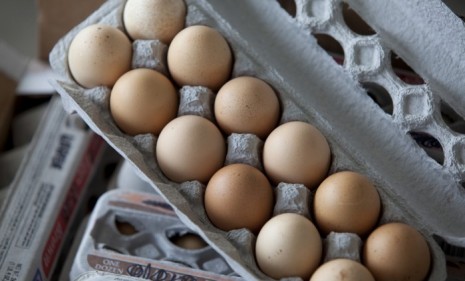The food safety bill: What will it do?
The Senate passed a bill meant to better protect the nation's food supply. Will it really make eating in America safer?

A free daily email with the biggest news stories of the day – and the best features from TheWeek.com
You are now subscribed
Your newsletter sign-up was successful
After more than a year of stalling, the Senate this week passed the Food Safety Modernization Act, which would massively overhaul the food-safety system for the first time in decades. But, thanks to a procedural mistake, the Senate might have to pass the bill again, and Republicans are threatening to block it until Democrats agree to a deal extending the Bush tax cuts. Democratic leaders insist the bill will become law, and have heralded it as a "major accomplishment" and a "significant achievement." But what will it really do? (Watch a Russia Today discussion about the bill)
Safer food at long last: About 5,000 American die each year because of food-borne illness, and it's about time the Food and Drug Administration got "the resources and authority to prevent food safety problems, rather than respond only after people have become ill," say Michael Pollan and Eric Schlosser in The New York Times. Thanks to this bill, imported foods will now be subject to the same standards as those made in the United States, which is only "reasonable."
"A stale food fight"
The Week
Escape your echo chamber. Get the facts behind the news, plus analysis from multiple perspectives.

Sign up for The Week's Free Newsletters
From our morning news briefing to a weekly Good News Newsletter, get the best of The Week delivered directly to your inbox.
From our morning news briefing to a weekly Good News Newsletter, get the best of The Week delivered directly to your inbox.
If the bill ever actually becomes law: Don't break out the organic champagne just yet, says Mary Clarke Jalonick at Forbes. While it was supposed to be headed for a quick passage in the House, where an earlier version was passed last year, the "procedural snafu" has given Republican leaders the chance to block it. The bill contains fees that are tax provisions, so under Congressional rules, it needed to originate in the House, not the Senate. Democrats will have to scramble to save it before they hand over control of the House.
"Snafu could stall food safety bill"
This is just more job-killing Democratic meddling: Highly publicized salmonella and E. coli outbreaks have people panicked, say the editors of The Wall Street Journal. But the reality is "that food-borne illnesses have fallen by nearly one-third over the last decade — largely because businesses have every incentive to police themselves." This bill would only help the Obama administration do what it does best — saddle businesses with unnecessary, job-killing regulations.
A free daily email with the biggest news stories of the day – and the best features from TheWeek.com
There is a cost, but food safety is worth it: Sure, fighting salmonella comes at a cost, says Bryan Walsh at Time. "The legislation is likely to require an extra $1.4 billion of additional spending over the next five years, most of that at the FDA," and critics say it could nudge food costs higher. But the Senate bill exempts most small farms, and focuses and industrial operations, which "pose a unique threat to food safety." That makes this bill "a welcome start" to lessening contamination in the food supply.
"Food: The senate passes a Food-Safety Bill, but the problem isn't going away"
-
 Why is the Trump administration talking about ‘Western civilization’?
Why is the Trump administration talking about ‘Western civilization’?Talking Points Rubio says Europe, US bonded by religion and ancestry
-
 Quentin Deranque: a student’s death energizes the French far right
Quentin Deranque: a student’s death energizes the French far rightIN THE SPOTLIGHT Reactions to the violent killing of an ultraconservative activist offer a glimpse at the culture wars roiling France ahead of next year’s elections
-
 Secured vs. unsecured loans: how do they differ and which is better?
Secured vs. unsecured loans: how do they differ and which is better?the explainer They are distinguished by the level of risk and the inclusion of collateral